The Fairbank Center for Chinese Studies at Harvard University presents a visual guide to the leaders of China’s economy. By Yuanzhuo Wang, Research Associate at Harvard Business School, and James Gethyn Evans, Communications Officer at the Fairbank Center.
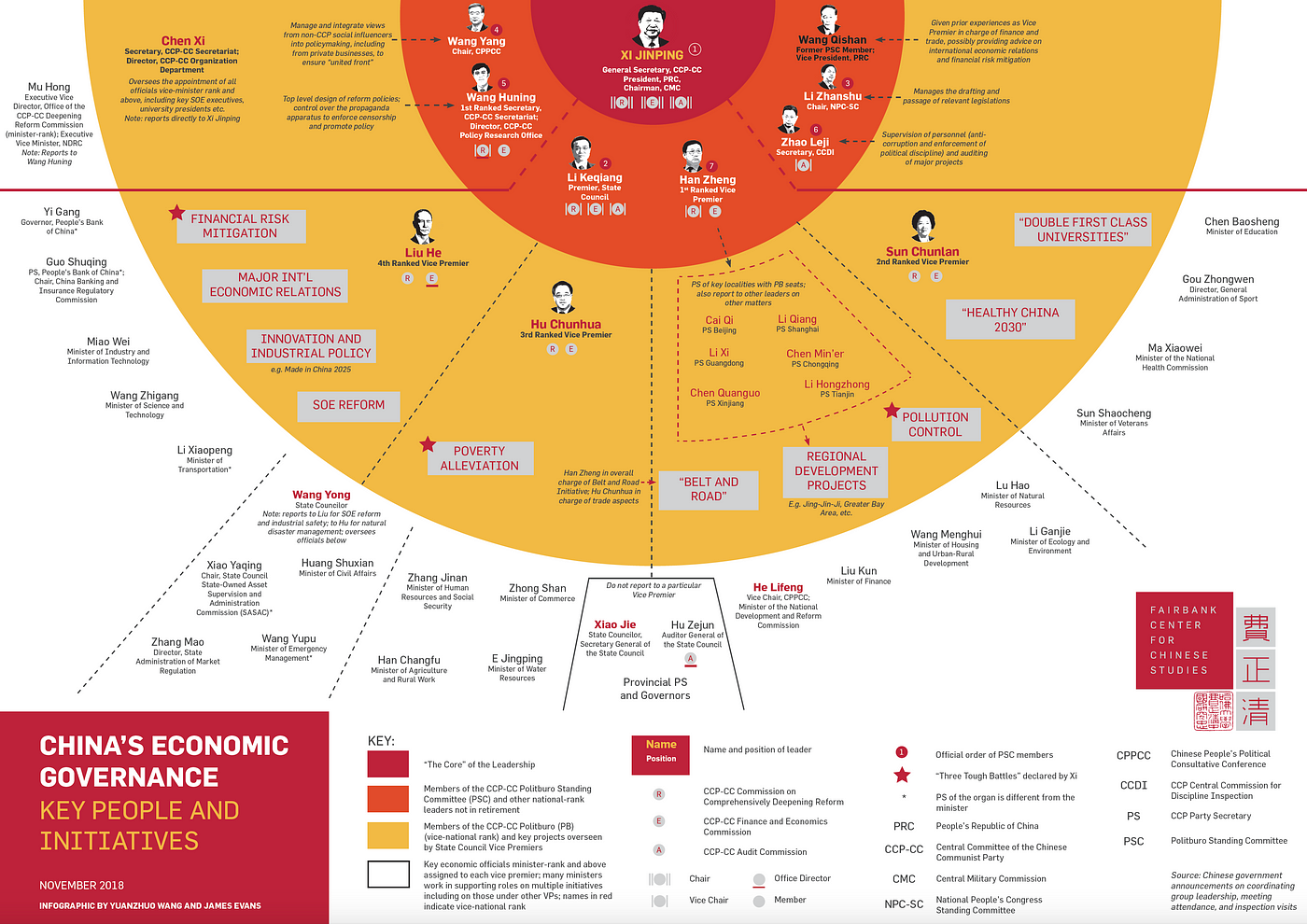
Download the full-sized infographic
As China marks 40 years of Reform and Opening Up, the Fairbank Center presents a visualization of China’s contemporary economic governance. Building on our previous infographic on China’s Leaders of Party and State, this infographic explains the role of each Politburo Standing Committee (PSC) member in the economic governance of the country, as well as the responsibilities of the country’s top economic officials, who mostly reside under the State Council (China’s central government).
The Premier of the State Council, by law, is in overall charge of the State Council bureaucracy. Vice Premiers, including the first-ranked Vice Premier with a PSC seat, and State Councilors, have specific areas of responsibility (分管领域) represented by their assigned ministry-level organs.
Each Vice Premier (and sometimes State Councilor) is also in charge of key policy initiatives that often require the participation of ministers overseen by other Vice Premiers (and/or other PSC or Politburo members if they fall outside the economic bureaucracy). In these cases, a coordinating body (议事协调机构) is usually established and chaired by the person in charge. In other words, even though most ministers are assigned to a specific Vice Premier or State Councilor who have primary oversight over them (which is how they are displayed in the infographic), ministers also report to other leaders for specific tasks. An office of the coordinating body is usually placed within a relevant ministry, which is overseen by a chair or vice chair to manage the day-to-day affairs of the body.
For example, the State Council Leading Group on Advancing the Development of Small and Medium Size Enterprises is chaired by Vice Premier Liu He, and has its office at the Ministry of Industry and Information Technology, which Liu himself oversees. One of the three Vice Chairs of the group is the Minister of Finance, who is overseen by Han Zheng. The 19 members of the group consist of vice minister-rank officials, who represent a variety of government bodies that could impact the development of SMEs.
In the infographic, the heads of the “constituent organs” (i.e. the ministries and commissions”) of the State Council (国务院组成部门) are displayed if they are overseen by a Vice Premier or State Councilor with an economic portfolio. Ministries like defense and foreign affairs are omitted because they are overseen by other Politburo or PSC members. Due to limited space, only some heads of the ministry-rank “directly subordinated organs” of the State Council (国务院直属机构) are displayed. A “*” is placed next to an organ if its minister/head does not concurrently serve as its Communist Party Secretary.
The rest of this blogpost gives a brief overview of the new CCP decision-making commissions. In particular, it profiles each of the leading economic officials, including the key initiatives they are in charge of, and the other State Council coordinating bodies they lead.

CCP-CC Decision Making and Coordinating Commissions
Under the Xi-era governing slogans of “the party controls all” (党管一切) and “top level design of policy” (政策顶层设计), economic decision-making seems to be concentrated in several CCP commissions chaired by Xi. Some of these commissions were upgraded from “leading small groups” in 2017 or 2018. Commissions are represented by gray circles in the infographic, along with adjoining symbols that denote leadership roles.
In economic governance, the CCP-CC Commission on Comprehensively Deepening Reform seems to be the most important commission. It has three PSC members — Li Keqiang, Wang Huning, and Han Zheng — as vice chairs, and one PSC member, Wang Huning, as Office Director (believed to an extension of his role as Director of the CCP-CC Policy Research Office). The five meetings of the commission have issued guidance on issues ranging from aid to the homeless, to the establishment of specialized internet and financial courts in select locations. (Links to 1st meeting, 2nd meeting, 3rd meeting, 4th meeting, and 5th meeting).
Another important body is the CCP-CC Finance and Economics Commission, traditionally the most relevant “leading small group” in economic decision making. The only vice chair is Li Keqiang, but both Wang Huning and Han Zheng serve as members. Politburo member and Vice Premier Liu He serves as the Office Director (办公室主任) of the commission, overseeing day-to-day affairs. This, along with his already expansive portfolio as Vice Premier and close relationship with Xi, positions Liu He at the center of the “top-level design” of economic policy.
Unlike other recent first-ranked Secretaries of the CCP-CC Secretariat, Wang Huning may be more involved in economic policy through hisroles on the CCP-CC Deepening Reform Commission and as the Director of the CCP-CC Policy Research Office while playing a reduced role in party organization. Wang was one of three PSC members (along with Wang Yang and Han Zheng) present at the meeting that Xi Jinping hosted for private business leaders in Beijing on November 1, 2018 to reassure them of his personal support.The propaganda system under Wang oversees the Cyberspace Administration of China (also known as the Office of the CPP-CC Commission on Internet Safety and Informatization, with the commission chaired by Xi Jinping), which enforces online censorship.
A new CCP-CC Audit Commission was also created and held its first meeting in May 2018. Li Keqiang and CCDI Secretary Zhao Leji are the vice chairs. The Auditor-General of the State Council serves as the Office Director. In the latest government restructuring in March, the National Audit Office gained the power to audit key national investment projects, execution of the central government budget, and the economic responsibilities of state-owned enterprise (SOE) executives. These powers were previously dispersed across several ministerial bodies. This new commission most likely oversees the expanded responsibilities of the Auditor-General’s Office.
Membership of these commissions beyond their chairs and vice chairs has not yet been revealed, but based on past precedence the Vice Premiers should be members of at least the Deepening Reform and Finance and Economics Commissions. It is also unclear what the exact relationships are between these commissions and the PSC, traditionally the highest decision making body within the CCP.
Despite not being formal members of these commissions, other PSC members (and former PSC member, current Vice President Wang Qishan), also exert influence on the economic governance of the country, either personally or through the organizations that they oversee.
Key Economic Officials — Who’s in Charge of What?
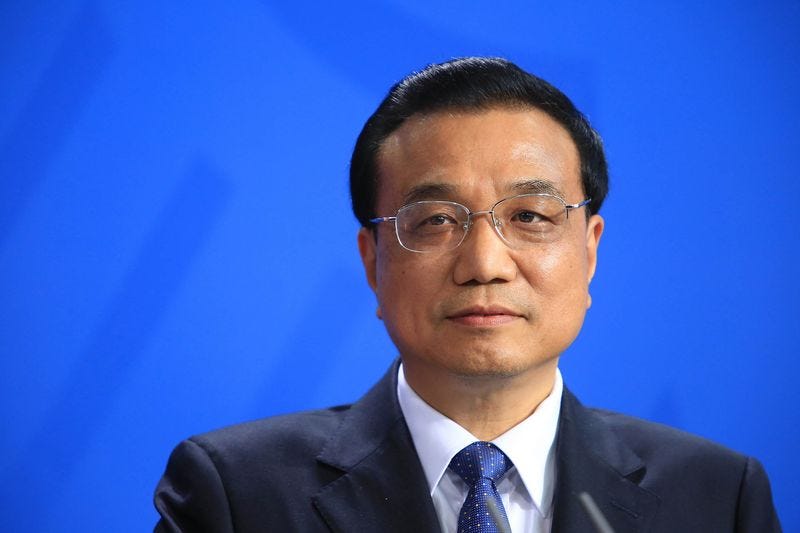
Li Keqiang 李克强, PSC Member, Premier and CCP Secretary of the State Council
In charge of:
- “Overall responsibility” for China’s economic bureaucracy
- State Council constituent organs not reporting to Vice Premiers or other PSC/PB members: State Council General Office; National Audit Office
- Provincial governors
Key initiatives: (has overall responsibilities for economic policy/initiatives; specifically chairs committees on):
Energy (with Han Zheng as Vice Chair); Revitalizing the Northeast (with Han Zheng as Vice Chair); Develop the West (with Han Zheng as Vice Chair); climate change (with Han Zheng as Vice Chair); and science and technology (with Liu He as Vice Chair).
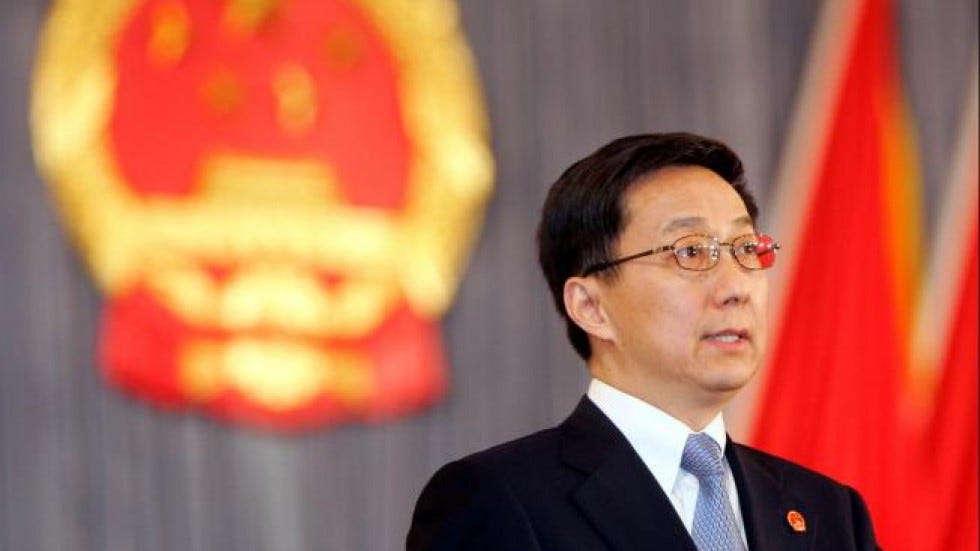
Han Zheng 韩正, PSC Member, Vice Premier and CCP Vice Secretary of the State Council
In charge of:
- Ministries: National Development and Reform Commission; Finance (i.e. government budget); Natural Resources; Ecology and Environment; Housing and Urban-Rural Development
- Other key ministry-rank organizations (not exhaustive): State Administration of Taxation
- Other initiatives: government restructuring; energy; food safety; statistics
Key initiatives:
- Pollution Control: part of the “Three Tough Battles” (三大攻坚战) declared by Xi in his report to the 19th Party Congress with goals to significantly reduce pollution by 2020 and increase forest coverage.
- “Belt and Road” (一带一路): worldwide development initiative for China-led infrastructure projects and trade.
- Regional Development Projects: key projects include:
- Beijing-Tianjin-Hebei Coordinated Development: disperse populations and institutions that are not essential to Beijing’s function as the national capital to surrounding areas, and build the region surrounding Beijing into a more sustainable and integrated megacity.
- Guangdong-Hong Kong-Macau Greater Bay Area: integrate the development of Hong Kong and Macau with that of Guangdong, including building more transportation links and supporting Shenzhen’s role as an innovation and technology hub.
- Yangtze River Economic Belt: promote sustainable economic development of the major city groups along the Yangtze River corridor from Shanghai to Chongqing.

Sun Chunlan 孙春兰, PB Member, Vice Premier
In charge of:
- Ministries: Education; National Health Commission; Veterans Affair
- Other key ministry-rank organizations (not exhaustive): General Administration of Sport
- Other initiatives/areas: healthcare reform; AIDS prevention; aging
Key initiatives:
- “Healthy China 2030” (健康中国 2030): improve the health and health awareness of the Chinese population, reduce healthcare costs, and build a healthcare system capable of supporting a rapidly aging population.
- “Double First Class Universities” (双一流大学建设): build a select group of Chinese universities into world leading “first class universities” with “first class (academic) disciplines.”

Hu Chunhua 胡春华, PB Member, Vice Premier
In charge of:
- Ministries: Agriculture and Rural Work; Commerce; Water Resources; Human Resources and Social Security
- Other key ministry-rank organizations (not exhaustive): General Administration of Customs
- Indirectly through State Councilor Wang Yong: Ministry of Emergency Management; Ministry of Civil Affairs?; State Administration of Market Regulation?
- Other initiatives: natural disaster management; rural workers; import expos; food safety (chaired by Han Zheng)
Key initiatives:
- Poverty Alleviation: part of the “Three Tough Battles”; lift ~30 million people in China out of poverty by 2020, and eliminate rural poverty.
- Trade aspects of the Belt and Road Initiative
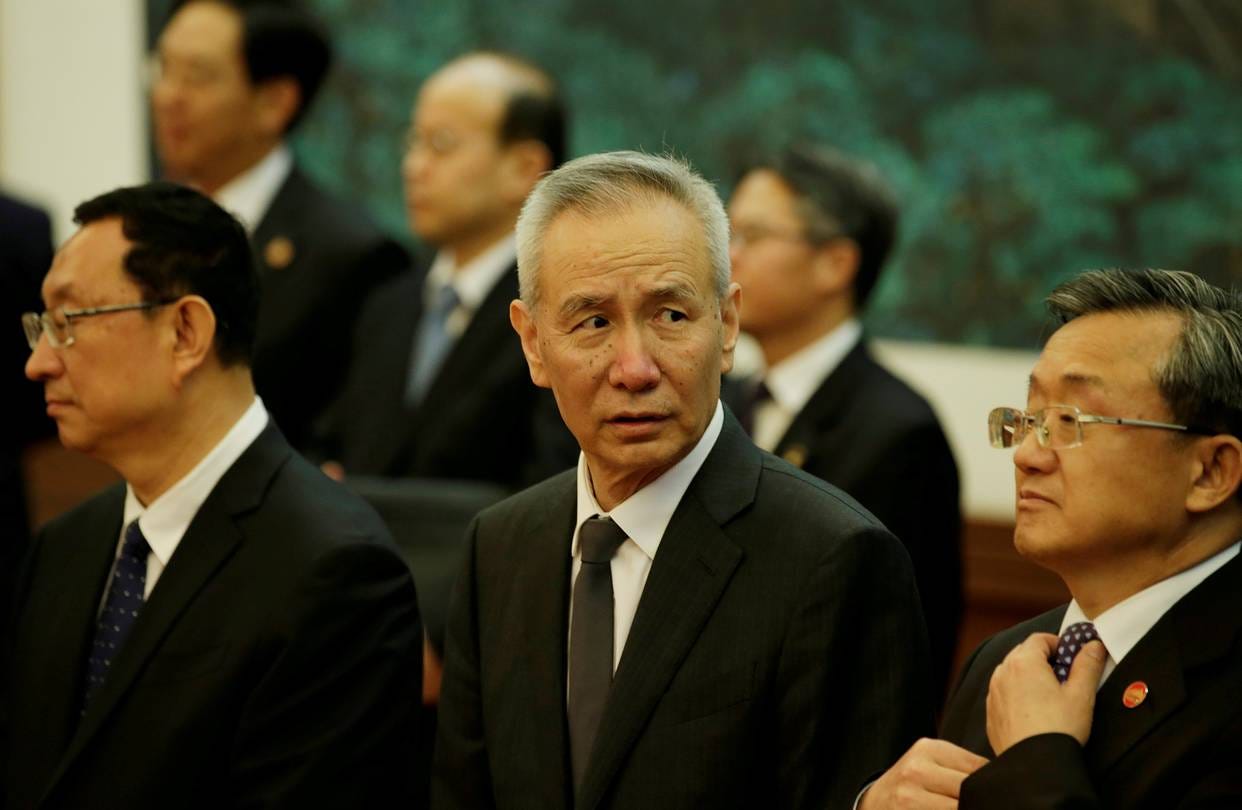
Liu He 刘鹤, PB Member, Vice Premier; Director, Office of the CCP-CC Finance and Economics Commission
In charge of:
- Top level design of economic policy and economic policy coordination as the Office Director of the CCP-CC Finance and Economics Commission
- Ministries: People’s Bank of China; Industry and Information Technology; Science and Technology; Transportation
- Other key ministry-rank organizations (not exhaustive): China Banking and Insurance Regulatory Commission; China Securities Regulatory Commission; Chinese Academy of Sciences; Chinese Academy of Engineering
- Indirectly through State Councilor Wang Yong: State Council State-Owned Asset Supervision and Administration Commission (SASAC); State Administration of Market Regulation?
- Other initiatives: industrial safety; small and medium size enterprises
Key initiatives:
- Financial Risk Mitigation: part of the “Three Tough Battles”; reduce debt levels and prevent systemic financial risks in the economy while maintaining stable growth.
- Innovation and Industrial Policy: increase domestic design and manufacturing of advanced technology components to ensure Chinese leadership in new technology areas like robotics and artificial intelligence. Encourage and finance innovation, including through initiatives like Made in China 2025.
- State-Owned Enterprise (SOE) Reform: fulfill Xi Jinping’s vision of building “stronger, better, and larger” SOEs that are internationally competitive and can lead the development of key technologies. Core aspects of the current reform agenda include consolidations, reforms in governance, compensation, and experimenting with “mixed-ownership,” i.e. encouraging more private investment in central and local SOEs.
- Major International Economic Relations: e.g. chairing the U.S.-China Comprehensive Economic Dialogue (and managing the ongoing U.S.-China Trade War) and the China-Europe High Level Economic Dialogue.
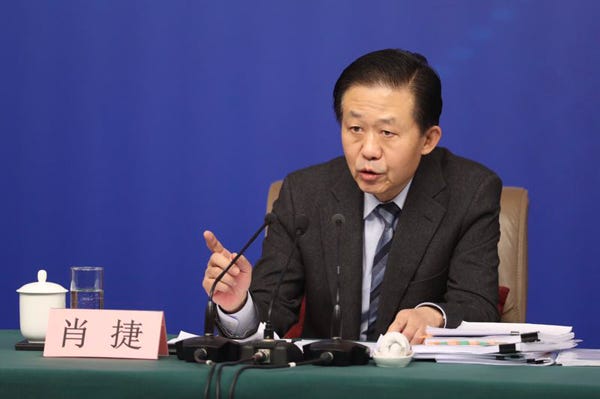
Xiao Jie 肖捷, CCP-CC Member, State Councilor, Secretary-General of the State Council
In charge of:
- Ministries: State Council General Office
- Chief of staff to Premier Li Keqiang
- Other initiatives: government restructuring (chaired by Han Zheng); open government

Wang Yong 王勇, CCP-CC Member, State Councilor
In charge of:
- Ministries: Civil Affairs; Emergency Management
- Other key ministry-rank organizations (not exhaustive): State Council State Owned-Asset Supervision and Administration Commission (SASAC); State Administration of Market Regulation
- Other initiatives: anti-trust; IP protection; people with disabilities; SOE reform (chaired by Liu He); industrial safety (chaired by Liu He); natural disaster management (chaired by Hu Chunhua); food safety (chaired by Han Zheng; co-vice chair by Hu Chunhua); government restructuring (chaired by Han Zheng; co-vice chair by Xiao Jie).

Download the full-sized infographic from the Fairbank Center’s website
Infographic and analysis by Yuan Wang, Research Associate at Harvard Business School, and James Evans, Publications Coordinator at the Fairbank Center.

